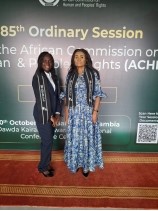|
Getting your Trinity Audio player ready...
|
MONROVIA – OCTOBER 24, 2025: The Association of Female Lawyers of Liberia (AFELL) and the Community Healthcare Initiative two partners of the Dignity Consortium in Liberia have issued a strong statement at the 85th Session of the African Commission on Human and People’s Rights in The Republic of Gambia calling for the criminalization of Female Genital Mutilation (FGM.
In their statement, the two organizations noted, “Together we present this position on the urgent need to criminalize Female Genital Mutilation in Liberia.
They noted, “FGM is a grave violation of human rights. The World Health Organization defines FGM as procedures that remove or injure female genitalia for non‑medical reasons. The practice inflicts severe, often irreversible physical and psychological harm, undermines sexual and reproductive health, and interrupts girls’ education, perpetuating inequality and disempowerment.”
They furthered, “We respect cultural heritage, but no tradition justifies practices that irreparably harm women and girls. FGM is incompatible with Liberia’s constitutional guarantees of life, liberty, and personal security, and with international and regional obligations that prohibit torture, cruel, inhuman or degrading treatment and require protection of the rights of women and children, including the Convention on the Elimination of All Forms of Discrimination against Women, the Convention on the Rights of the Child, and the African Charter on Human and Peoples’ Rights.”
“We welcome the leadership shown by President Joseph Nyemah Boakai when, at the 80th Session of the UN General Assembly, he called for a permanent ban on harmful traditional practices, including FGM. High‑level statements are important, but must be translated into effective, enforceable law. The African Commission has made clear that soft‑law measures and policy statements are insufficient; explicit criminalization is required to protect vulnerable women and girls and to hold perpetrators accountable”.
Accordingly, CHI and AFELL urgently call on the Government of Liberia and the Legislature to take the following concrete steps without delay, issue an Executive Order banning the practice of FGM immediately; and expedite enactment of specific legislation that criminalizes all forms of FGM, provides for prevention, protection, access to justice and remedies for survivors, and allocates resources for enforcement and survivor support.
“To the African Commission, we respectfully request your support in the following ways, urge the Government of Liberia to adopt an immediate ban and to prioritize drafting and passing comprehensive FGM legislation; recommend monitoring and reporting mechanisms to track compliance and protection for survivors; provide technical assistance to ensure that legislation is victim‑centered, culturally sensitive, and consistent with Liberia’s regional and international obligations; and support community‑led prevention programs, survivor services, and training for health, justice and law‑enforcement actors.
According to AFELL and CHI, the continued tolerance of FGM is a profound injustice and a direct assault on the dignity and rights of Liberian women and girls. With presidential leadership now on record, Liberia has the opportunity to align its laws with its human rights obligations and to lead by example in the region.
“We stand ready to collaborate with the Commission, the Government of Liberia, civil society, traditional leaders and affected communities to ensure the protection, healing and dignity of survivors, and to secure the full eradication of this harmful practice,” the statement concluded.


Comments are closed.